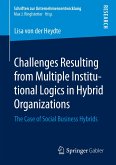This book analyzes the recent development of accounting in Japan from an interdisciplinary perspective, focusing specifically on how institutional reality is constructed. Integrating theoretical perspectives from institutional economics and performativity studies, the book creates a framework to systematically explain institutional changes and dynamics against a backdrop of increasing globalization and financialization.
The first part of the book connects Searlean theories of institutional reality and social ontology with studies in performativity, particularly its linguistic aspects, to show how collectively accepted social norms can performatively shape institutions. The second section explores how these patterns can be uniquely traced in the recent history of Japan's financial accounting standards and institutions, in particular how globalization, financialization, fair value accounting and a shareholder-value primacy form of corporate governance have prevailed. It alsoexplores the establishment of the International Accounting Standards Board (IASB) and the increasing global convergence of accounting standards. The book argues that multiple collectively accepted performative norms can be identified simultaneously in Japanese accounting, as well as discussing how these social dynamisms are identified and dispersed linguistically (such as by researchers and journalists). This book will be of interest to those working in accounting and financial reporting, as well as those working in social studies of finance, economic sociology, and institutional economics.
The first part of the book connects Searlean theories of institutional reality and social ontology with studies in performativity, particularly its linguistic aspects, to show how collectively accepted social norms can performatively shape institutions. The second section explores how these patterns can be uniquely traced in the recent history of Japan's financial accounting standards and institutions, in particular how globalization, financialization, fair value accounting and a shareholder-value primacy form of corporate governance have prevailed. It alsoexplores the establishment of the International Accounting Standards Board (IASB) and the increasing global convergence of accounting standards. The book argues that multiple collectively accepted performative norms can be identified simultaneously in Japanese accounting, as well as discussing how these social dynamisms are identified and dispersed linguistically (such as by researchers and journalists). This book will be of interest to those working in accounting and financial reporting, as well as those working in social studies of finance, economic sociology, and institutional economics.








